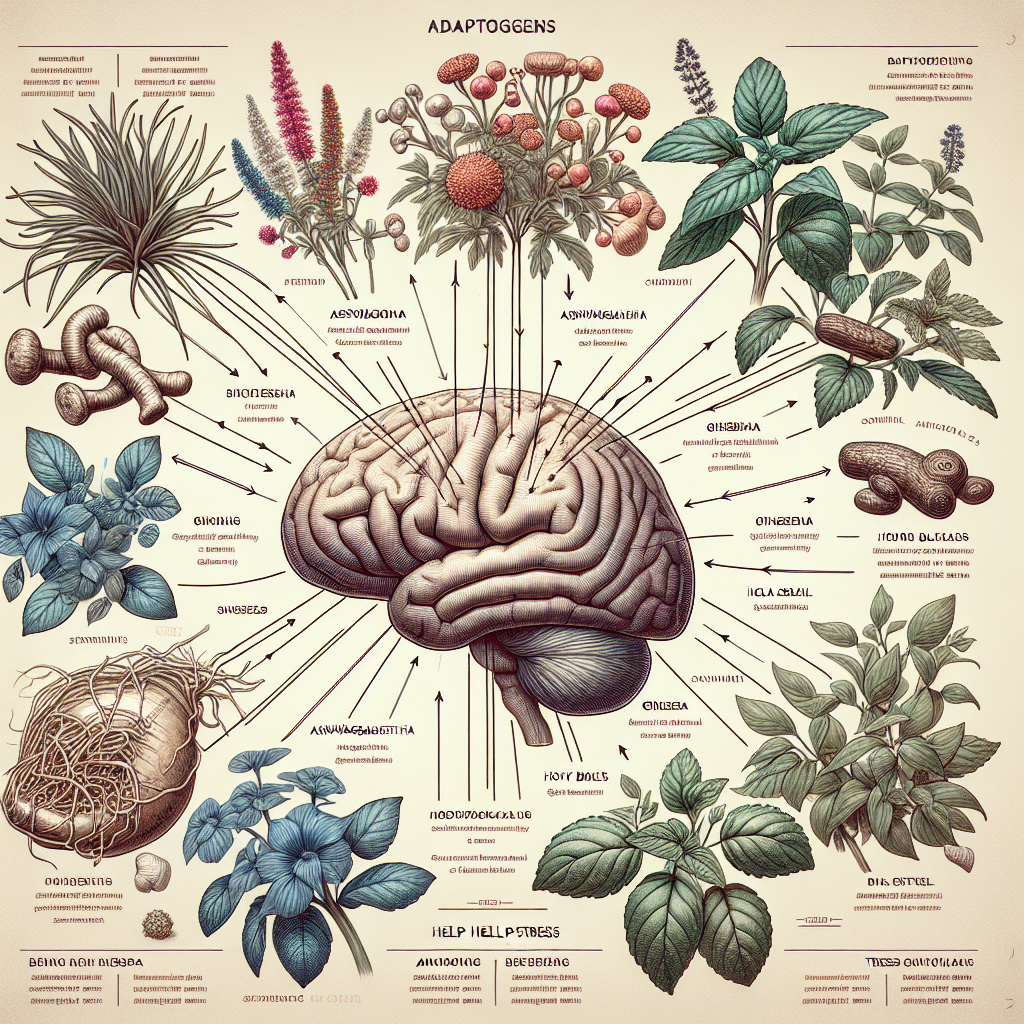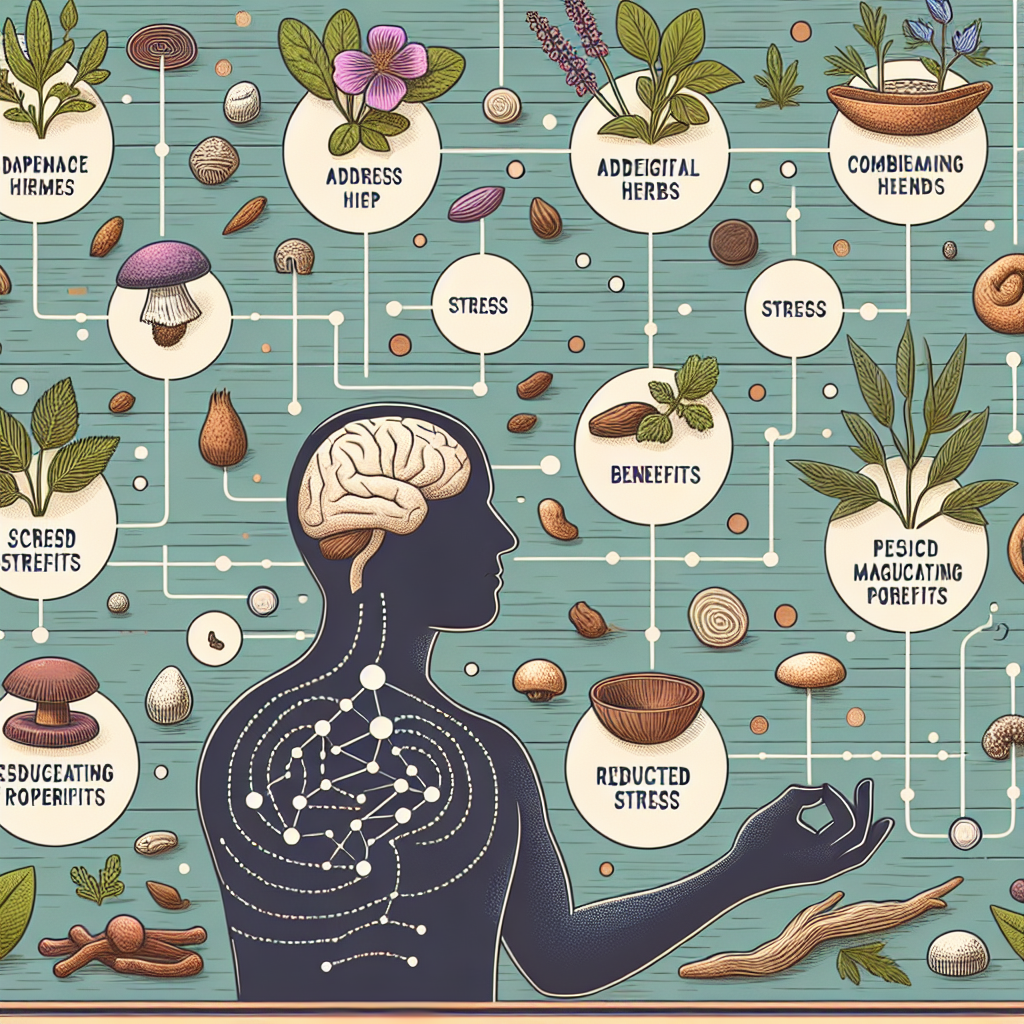Adaptogens and How They Help Combat Stress

Discover the power of adaptogens and how they can help combat stress. Learn more about these natural stress-fighters and how to incorporate them into your daily routine. Don’t let stress control your life. Take action now and visit My Vibrant Vitality to start your journey towards a stress-free life.
Understanding the Role of Adaptogens in Stress Management
Adaptogens, a class of herbs and mushrooms that have been used for centuries in traditional medicine, are gaining recognition in the modern world for their potential to combat stress. These natural substances are believed to help the body adapt to stress, support normal metabolic processes, and restore balance. They increase the body’s resistance to physical, biological, emotional, and environmental stressors and promote a sense of well-being.
The term “adaptogen” was coined in the mid-20th century by Russian scientists to describe a substance that increases the body’s non-specific resistance to stress. The concept is based on the idea that certain natural substances can help the body adapt to stress and normalize its functions. This is achieved by supporting the adrenal glands, which are responsible for the body’s hormonal response to stress.
Adaptogens work in a unique way. Unlike other substances that have a specific target in the body, adaptogens have a broad impact on the body’s overall function. They help to balance, restore, and protect the body by responding to stress signals and controlling the body’s stress response. They do this by interacting with the hypothalamic-pituitary-adrenal (HPA) axis and the sympathoadrenal system, both of which are involved in the body’s response to stress.
The HPA axis is a complex set of interactions between the hypothalamus, the pituitary gland, and the adrenal glands. It regulates many of the body’s processes, including stress response, mood, and energy usage. When a person is under stress, the HPA axis is activated, leading to an increase in cortisol, the body’s primary stress hormone. Adaptogens help to modulate the body’s cortisol levels, reducing the harmful effects of stress.
The sympathoadrenal system, on the other hand, is responsible for the body’s fight-or-flight response. It involves the release of adrenaline, which prepares the body for immediate action. Adaptogens help to balance this response, preventing the body from overreacting to stress.
Some of the most well-known adaptogens include Ashwagandha, Rhodiola Rosea, and Panax Ginseng. Ashwagandha, a staple in Ayurvedic medicine, is known for its ability to reduce anxiety and improve sleep. Rhodiola Rosea, a plant native to the Arctic regions, is believed to increase energy, stamina, and mental capacity. Panax Ginseng, also known as Asian ginseng, is renowned for its ability to boost energy levels and improve cognitive function.
While the benefits of adaptogens are promising, it’s important to remember that they are not a cure-all. They should be used as part of a holistic approach to stress management, which includes a balanced diet, regular exercise, and good sleep hygiene. It’s also crucial to consult with a healthcare provider before starting any new supplement regimen, as some adaptogens can interact with medications and may not be suitable for everyone.
In conclusion, adaptogens offer a natural way to help the body cope with stress. They work by supporting the body’s stress response systems and promoting balance. While more research is needed to fully understand their mechanisms of action and potential benefits, current evidence suggests that they could be a valuable tool in managing stress and promoting overall well-being.
Harnessing the Power of Adaptogens to Fight Stress

Adaptogens, a class of herbs and mushrooms that have been used for centuries in traditional medicine, are gaining recognition in the modern world for their potential to combat stress. These natural substances are known for their ability to help the body adapt to stress, hence the name ‘adaptogens’. They work by interacting with the hypothalamic-pituitary-adrenal (HPA) axis and the sympathoadrenal system, both of which are involved in the body’s response to stress.
The concept of adaptogens was first introduced by Russian scientists in the mid-20th century, who were searching for a substance that could increase the body’s resistance to stress. They discovered that certain herbs and mushrooms could enhance the body’s ability to cope with different stressors, whether physical, chemical, or biological. These adaptogens were found to have a normalizing effect, helping to restore balance in the body’s systems.
Adaptogens function in a unique way. Unlike other substances that have a specific action, adaptogens have a broad action. They help the body maintain homeostasis, the state of equilibrium that is essential for its proper functioning. When the body is under stress, it responds by releasing stress hormones. If the stress is prolonged, this can lead to an imbalance in the body’s systems, resulting in various health problems. Adaptogens help to modulate the body’s stress response, reducing the production of stress hormones and helping the body return to a state of balance.
There are many different types of adaptogens, each with its own unique properties. Some of the most well-known include Ashwagandha, Rhodiola Rosea, and Holy Basil. Ashwagandha, a herb used in Ayurvedic medicine, is known for its ability to reduce anxiety and improve sleep. Rhodiola Rosea, a plant native to the Arctic regions, is known for its ability to enhance mental performance and reduce fatigue. Holy Basil, also known as Tulsi, is revered in India for its ability to promote longevity and enhance the body’s resilience to stress.
Incorporating adaptogens into your daily routine can be a powerful way to combat stress. They can be consumed in various forms, including teas, tinctures, and capsules. However, it’s important to remember that while adaptogens can help manage stress, they are not a cure-all. They should be used as part of a holistic approach to stress management, which includes a balanced diet, regular exercise, and good sleep hygiene.
Research on adaptogens is still in its early stages, but the results so far are promising. Studies have shown that adaptogens can help reduce the symptoms of stress and anxiety, improve mental performance, and enhance physical endurance. However, more research is needed to fully understand their mechanisms of action and potential side effects.
In conclusion, adaptogens offer a natural, holistic approach to managing stress. By helping the body adapt to stress and restore balance, they can enhance our resilience and overall well-being. As we continue to navigate the stresses of modern life, adaptogens may prove to be a valuable ally in our quest for health and balance.
Exploring the Impact of Adaptogens on Stress Reduction
Adaptogens, a class of herbs and mushrooms that have been used for centuries in traditional medicine, are gaining recognition in the modern world for their potential to combat stress. These natural substances are believed to help the body adapt to stress and promote a sense of balance and calm. As we delve into the impact of adaptogens on stress reduction, it’s important to understand the science behind these powerful plants and how they can be incorporated into our daily lives.
Stress, a common phenomenon in today’s fast-paced world, can have detrimental effects on our physical and mental health. It can lead to a host of health problems, including heart disease, diabetes, anxiety, and depression. This is where adaptogens come into play. They work by interacting with the hypothalamic-pituitary-adrenal (HPA) axis and the sympathoadrenal system, both of which are involved in the body’s response to stress. By modulating these systems, adaptogens can help the body maintain balance and resist the damaging effects of stress.
One of the most well-known adaptogens is Ashwagandha, a plant native to India and North Africa. Studies have shown that Ashwagandha can significantly reduce cortisol levels, the body’s primary stress hormone. By lowering cortisol, Ashwagandha can help alleviate symptoms of stress and anxiety. Another popular adaptogen is Rhodiola Rosea, a plant that grows in the cold, mountainous regions of Europe and Asia. Rhodiola has been found to enhance the body’s resistance to stress, reduce fatigue, and improve mental performance.
In addition to these, there are several other adaptogens like Holy Basil, Siberian Ginseng, and Cordyceps that have been found to have stress-reducing properties. Each adaptogen has its unique set of benefits and can be used in different ways. Some can be consumed as teas or tinctures, while others can be taken as supplements. It’s important to note that while adaptogens can help manage stress, they are not a cure-all. They should be used as part of a holistic approach to stress management that includes a balanced diet, regular exercise, and adequate sleep.
While the research on adaptogens is promising, it’s still in its early stages. More studies are needed to fully understand the mechanisms through which these plants work and to establish standardized dosages. However, the existing evidence suggests that adaptogens can be a valuable tool in our arsenal against stress.
As we continue to navigate the challenges of modern life, the importance of managing stress cannot be overstated. Adaptogens, with their potential to help the body adapt to stress and promote balance, offer a natural and holistic approach to stress management. By incorporating these powerful plants into our daily routines, we can take a proactive step towards better health and well-being.
In conclusion, adaptogens are a promising solution to the pervasive problem of stress. They offer a natural, holistic approach to stress management, helping to restore balance in the body and promote a sense of calm. While more research is needed, the existing evidence suggests that adaptogens can play a significant role in helping us manage stress and maintain our health in today’s fast-paced world.